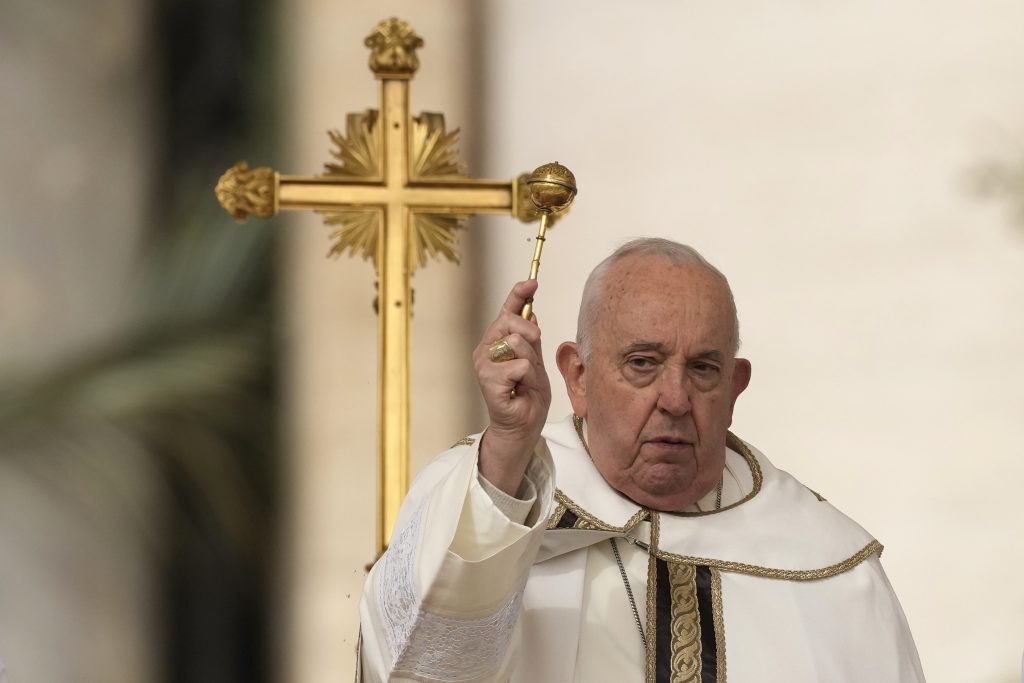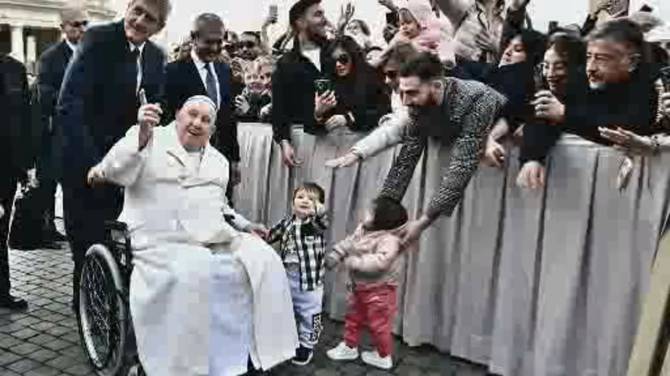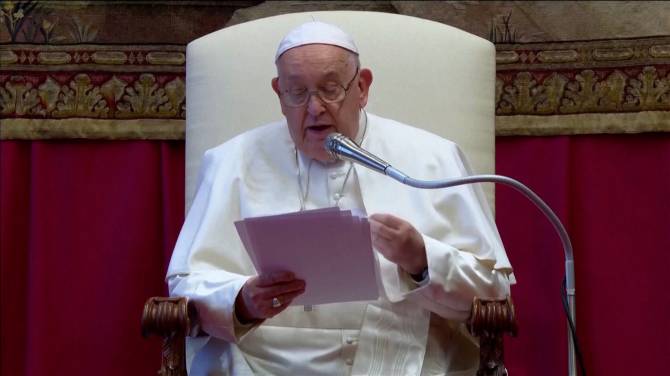Pope Francis recovered from a long period of respiratory problems to lead about 60,000 people in Easter festivities on Sunday, making a strong request for a truce in Gaza and an exchange of prisoners between Russia and Ukraine.
Francis led Easter Sunday Mass in a flower-filled St. Peter’s Square and then offered a sincere prayer for peace in his yearly review of global crises. The people in Gaza, including the small Christian community there, have been a constant worry for Francis and Easter in the Holy Land was subdued this year due to the war.
“Peace isn't achieved with weapons, but with open hands and open hearts,” Francis stated from the balcony overlooking the square, receiving applause from the crowd below.
Francis seemed in good health, despite having conducted the 2 1/2-hour nighttime Easter Vigil just hours earlier. The pontiff, who had part of one lung removed in his youth, has been struggling with respiratory issues all winter, and his full participation in Easter services was not completely certain, especially after he skipped the traditional Good Friday procession.
But as an indication that the 87-year-old pontiff was feeling fine, he made several rounds around the square in his popemobile after Mass, greeting well-wishers.

View image in full screen
(AP Photo/Andrew Medichini)

View image in full screen
(AP Photo/Andrew Medichini)
The Vatican reported that about 60,000 people attended the Mass, with more filling the Via della Conciliazione boulevard leading to the square. At the start of the service, a strong wind knocked over a large religious icon on the altar just a few feet from the pope; ushers quickly set it upright.
Easter Mass is one of the most significant dates on the religious calendar, commemorating what the faithful believe was Jesus’ resurrection after his crucifixion. The Mass precedes the “Urbi et Orbi” (to the city and the world) blessing, in which the pope traditionally provides a exhaustive list of the threats affecting humanity.
This year, Francis expressed his concerns particularly for people in Ukraine and Gaza and all those enduring war, particularly the children who he said had “forgotten how to smile.”
“By calling for respect for the principles of international law, I express my hope for a general exchange of all prisoners between Russia and Ukraine: all for the sake of all!” he remarked.
He urged for the “immediate” release of prisoners taken from Israel on Oct. 7, an instant truce in Gaza and for humanitarian aid to reach Palestinians.
“Let us not allow the current hostilities to continue to have serious effects on the civilian population, who are now at their limit, and especially on the children,” he said in a speech that also addressed the situation of Haitians, the Rohingya, and victims of human trafficking.
In the recent weeks, Francis has mostly avoided giving long speeches to help his breathing. He skipped his Palm Sunday speech last week and decided last minute to stay home from the Good Friday procession at the Colosseum.
The Vatican explained that the decision was made to preserve his health.
The choice turned out well, as Francis was able to say the prayers of the long Saturday night Easter Vigil service, including giving the sacraments of baptism and First Communion to eight new Catholics, and lead Easter Sunday Mass and give his speech.

View image in full screen
(AP Photo/Andrew Medichini)
Francis wasn’t the sole leader whose presence at Easter offered a comforting sign of stability and normalcy.
In Britain, King Charles III joined the queen and other members of the royal family for an Easter service at Windsor Castle in his most significant public outing since he was diagnosed with cancer last month.
The monarch greeted spectators with a cheerful wave as he walked into St. George’s Chapel, and then spent time shaking hands and greeting well-wishers after the service. “You’re very brave to stand out here in the cold,” Charles told them.
However, things were far from normal in Jerusalem, as Easter Mass took place at the Church of the Holy Sepulcher. Only a few dozen faithful attended the service as the Israel-Hamas conflict rages on in Gaza.
The ancient church in the Old City is the sacred place where Christians believe Jesus was crucified, buried and resurrected.
In past years, the church has been full of worshippers and tourists. But the violent conflict in Gaza, now in its sixth month, has led to a significant decrease in tourism and pilgrimages across Israel and the Palestinian territories.
The streets of the old city were also devoid of Palestinian Christians from the West Bank, who usually come to the city for Easter. Since the conflict began, Palestinian worshippers from the Israeli-occupied territory have needed special permission to cross checkpoints into Jerusalem.
In Gaza, the situation was even more grim. Only a few dozen Palestinian Christians celebrated Easter Mass at the Holy Family Church in Gaza City, but there wasn’t much to celebrate.
“This doesn’t feel like Easter, like other times,” said Winnie Tarazi, a Christian from Gaza City. “It’s because we are here deprived of our homes, our belongings, our children, and everything. We lost our family between those who fled, who stayed, and who were destroyed.”
The feeling was similar in the West Bank town of Bethlehem, the traditional birthplace of Jesus, where only a few dozen people attended Mass at the Church of the Nativity.
”There is no holiday atmosphere and there is no joyful atmosphere this year,” said Bethlehem resident George Kanawati. “The holidays lack joy and the smile of children, which the occupation always tries to erase and kill this smile.”

View image in full screen
(AP Photo/Andrew Medichini)
In New York, the situation in Gaza was also a worry. Three people were arrested by the police for causing trouble at the Easter Vigil Mass at Manhattan's St. Patrick's Cathedral on Saturday. They displayed a banner that said "Silence = Death" on the altar and shouted "Free Palestine" as they were taken out, according to the police.
In the Nineveh Plains of Iraq, where 10 years ago the Islamic State group killed and displaced thousands of minority Iraqis, hundreds of people observed Easter in an area that has had a Christian presence since around the time of Jesus. Iraq's Christian community, which was once about 1.5 million strong, now totals at most a few hundred thousand, but they came out in large numbers for Easter.
Nassar Mubarak, who attended Easter Mass at the Immaculate Conception church in Qaraqosh, stated, “We will definitely stick to this land and remain here until the last, and hope for a change.”





